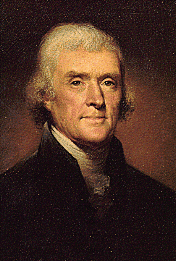 Culture & Ethics
Culture & Ethics
 Faith & Science
Faith & Science
Thomas Jefferson: Intelligent Design Not Based on Religion
Next time someone tells you intelligent design is “based on religion,” you might point him to American Founder Thomas Jefferson, author of the Declaration of Independence. As I explain in a special July 4th edition of ID the Future, Jefferson not only believed in intelligent design, he insisted it was based on the plain evidence of nature, not religion.
Ironically, the critics of intelligent design often think they are defending the principles of Jefferson. The National Council for the Social Studies, for example, claims that intelligent design is religion and then cites Jefferson’s famous Letter to the Danbury Baptists calling for a “wall of separation” between church and state. The clear implication is that Thomas Jefferson would agree with them that intelligent design is religion. A writer for Irregular Times goes even further, insisting that “the case of Thomas Jefferson makes it quite clear that there was not a consensus of support among the authors of the Constitution to allow for the mixing of religion and government to support theological doctrines such as intelligent design.”
In reality, Jefferson did not believe that intelligent design was a religious doctrine. In a letter to John Adams on April 11, 1823, he declared:
I hold (without appeal to revelation) that when we take a view of the Universe, in its parts general or particular, it is impossible for the human mind not to perceive and feel a conviction of design, consummate skill, and indefinite power in every atom of its composition. (emphasis added)
By insisting that his defense of intelligent design was made “without appeal to revelation,” Jefferson clearly was arguing that the idea had a basis other than religion. What was that basis? He went on to explain:
The movements of the heavenly bodies, so exactly held in their course by the balance of centrifugal and centripetal forces, the structure of our earth itself, with its distribution of lands, waters and atmosphere, animal and vegetable bodies, examined in all their minutest particles, insects mere atoms of life, yet as perfectly organised as man or mammoth, the mineral substances, their generation and uses, it is impossible, I say, for the human mind not to believe that there is, in all this, design, cause and effect, up to an ultimate cause, a fabricator of all things from matter and motion, their preserver and regulator while permitted to exist in their present forms, and their regenerator into new and other forms.
In sum, Jefferson believed that empirical data from nature itself proved intelligent design by showing the natural world’s intricate organization from the level of plants and insects all the way up to the revolution of the planets.
As I document in my book The Politics of Revelation and Reason, Jefferson was hostile toward traditional Christianity and lashed out in private at those who believed in the divinity of Jesus. He even created his own redacted version of the New Testament from which he cut out the miracles. So he certainly can’t be accused of trying to promote “Christian fundamentalism.”
That makes his defense of intelligent design as based on unassisted reason rather than divine revelation all the more powerful.
If more people knew about Jefferson’s real views on intelligent design, they might not be so quick to accept bogus claims that it is simply repackaged theology.

